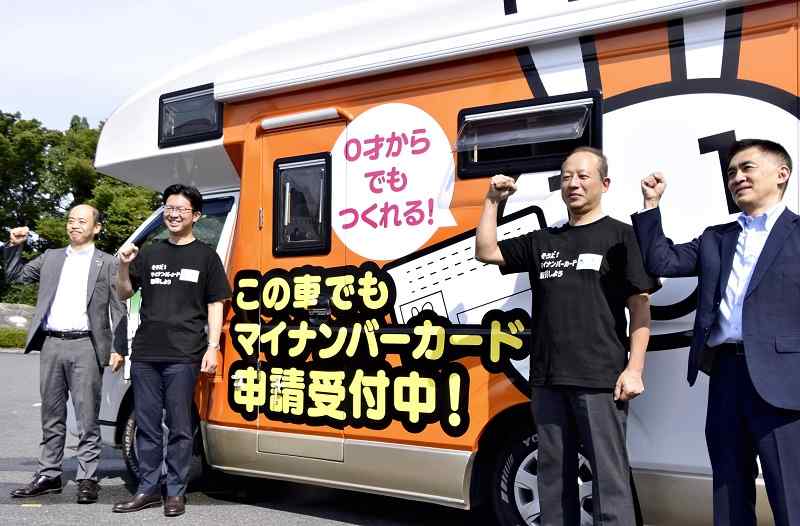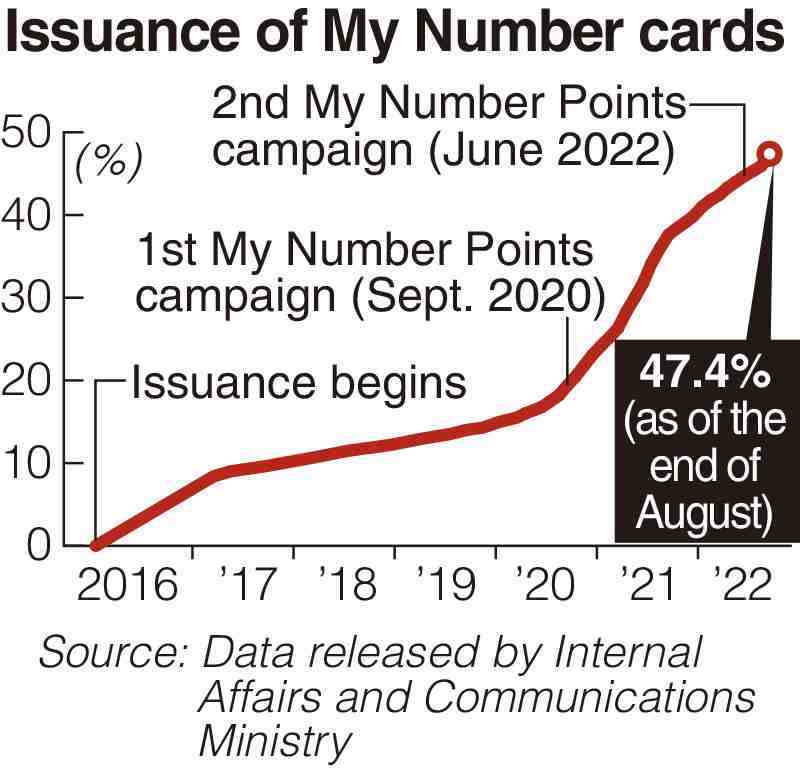Japan strives to boost uptake of individual ID cards

The city of Yonago, Tottori Prefecture, has outfitted a van to serve as a mobile station for My Number card applications. Mayor Takashi Igi, 2nd from left, and city government staff join in a kickoff ceremony for the vehicle on Sept. 14.
15:20 JST, September 23, 2022
The government continues to push for further uptake of the My Number identification card, which it considers the foundation of a digital society.
The government is keen to emphasize the card’s improved convenience for administrative services and the benefits of its My Number Point reward campaigns. However, as of the end of August, fewer than 50% of the population had applied for a card, likely making it difficult for the government to realize its aim of having “almost all citizens hold a card” by the end of the current fiscal year.
“I want you to make every effort to promote the use of My Number cards,” Kishida said to the ministers responsible for the scheme’s promotion — including Internal Affairs and Communications Minister Minoru Terada, Health, Labor, and Welfare Minister Katsunobu Kato and State Minister for Digital Transformation Masaki Ogushi — at the Prime Minister’s Office on Aug. 31.
According to the Internal Affairs and Communications Ministry, 47.4% of the population have received a card since the scheme launched in January 2016, with some 59.66 million cards in use as of the end of August this year.
The card. which enables holders to make online applications for administrative services, is expected to reduce the administrative workload of local governments and other entities such as when remitting public funds.
The card also can be used for identity verification purposes within the private sector. Having more people hold My Number cards is key for Kishida to realize his administration’s “Digital Garden City Nation Initiative.”

Health insurance, points redemption
The government has twice implemented My Number Points campaigns, in which people applying for a card can receive a refund of ¥20,000 in point form, which can then be exchanged for electronic money and other items. The government has also developed other measures to promote the card such as by subsidizing local governments, which can add extra points to cards on their own initiative, for example.
The government also is encouraging the use of My Number cards as health insurance cards. Use of the card for vaccination-related procedures reportedly simplifies and speeds up procedures by eliminating the need for paper-based vaccination coupons. The government is eyeing further expansion of the card’s functionality in the future, and Digital Transformation Minister Taro Kono has proposed that the government should advance research into having the card act as a “driver license.”
The government also wants to simplify the application procedure for the card. In addition to encouraging cell phone sales agents to provide help with applications, the Internal Affairs and Communications Ministry is also calling on local governments to open branch offices to spur applications. After inspecting one such application center on Sept. 8, Terada said, “It’s important for the public to realize the card’s benefits.”
However, some potential users remain reluctant about having their private information centralized by the government. According to a survey conducted last year by NTT Data Institute of Management Consulting, Inc., the most common reason for people not applying was “I can live without it” (48.1%), followed by “I’m concerned about my private information leaking out” (34.3%).
The government is coming under increasing scrutiny as public awareness of economic security grows. This month, the Digital Agency released a video on TikTok — a video-sharing application from China — to raise awareness of My Number cards.
In response, Takayuki Kobayashi, a former minister in charge of economic security, took to Twitter to ask, “Has this initiative been properly considered within the government?” Kobayashi has reportedly expressed concern that the Digital Agency used TikTok, which is known for being hit by data leaks that affected users in the United States and other countries.



